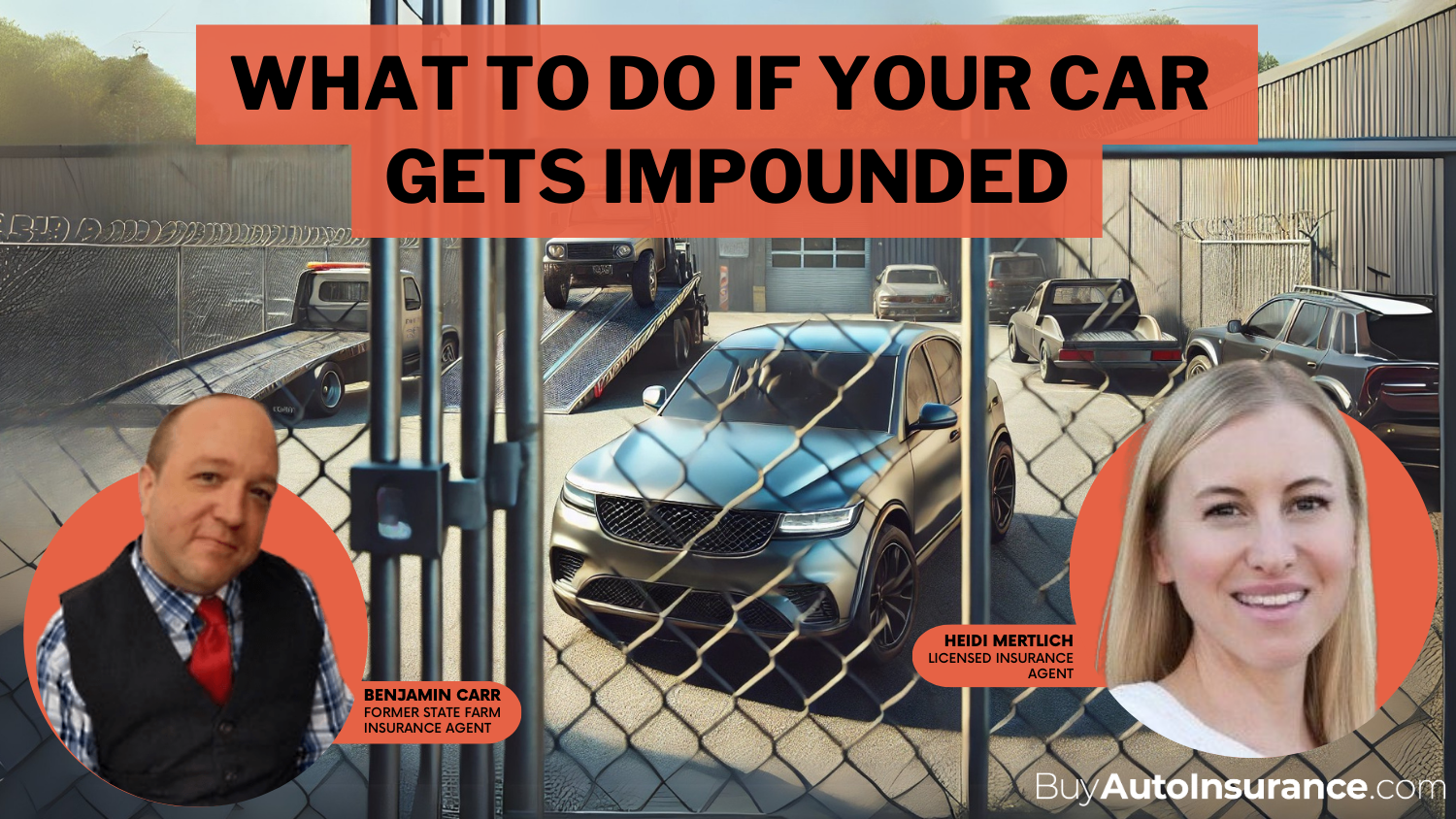What happens if your car is impounded?
If your car has been impounded there are several ways you can get it back. However your auto insurance rates could go up depending on the reason your car was impounded in the first place.
Free Car Insurance Comparison
Compare Quotes From Top Companies and Save
Secured with SHA-256 Encryption

Heidi Mertlich
Licensed Insurance Agent
Heidi works with top-rated insurance carriers to bring her clients the highest quality protection at the most competitive prices. She founded NoPhysicalTermLife.com, specializing in life insurance that doesn’t require a medical exam. Heidi is a regular contributor to several insurance websites, including FinanceBuzz.com, Insurist.com, and Forbes. As a parent herself, she understands the need ...
Licensed Insurance Agent
UPDATED: Mar 16, 2025
It’s all about you. We want to help you make the right coverage choices.
Advertiser Disclosure: We strive to help you make confident auto insurance decisions. Comparison shopping should be easy. We are not affiliated with any one auto insurance provider and cannot guarantee quotes from any single provider. Our auto insurance industry partnerships don’t influence our content. Our opinions are our own. To compare quotes from many different auto insurance companies please enter your ZIP code on this page to use the free quote tool. The more quotes you compare, the more chances to save.
Editorial Guidelines: We are a free online resource for anyone interested in learning more about auto insurance. Our goal is to be an objective, third-party resource for everything auto insurance related. We update our site regularly, and all content is reviewed by auto insurance experts.
UPDATED: Mar 16, 2025
It’s all about you. We want to help you make the right coverage choices.
Advertiser Disclosure: We strive to help you make confident auto insurance decisions. Comparison shopping should be easy. We are not affiliated with any one auto insurance provider and cannot guarantee quotes from any single provider. Our auto insurance industry partnerships don’t influence our content. Our opinions are our own. To compare quotes from many different auto insurance companies please enter your ZIP code on this page to use the free quote tool. The more quotes you compare, the more chances to save.
On This Page
- If police impound your vehicle, you must pay a specific amount to get it back from the impound lot
- Law enforcement can impound your vehicle for a variety of reasons, but calling your local police station should help you figure out where it is
- You can expect to pay more in auto insurance once your provider learns of your moving violation
Frequently Asked Questions
Will my insurance company drop me if my car is impounded?
Your insurance company may not drop you immediately, but they may increase your rates. Contact your insurance provider to understand how the impoundment may affect your coverage and rates.
Can I remove the impoundment record from my driving record?
In most cases, you cannot remove the impoundment record from your driving record until the specified period defined by your state’s laws has passed.
Will the impoundment affect my credit score?
No, the impoundment itself does not directly impact your credit score. However, unpaid fees or fines could lead to financial issues that may affect your credit if left unresolved.
Can I dispute the impoundment of my vehicle?
Yes, you may have the option to dispute the impoundment. Contact local authorities or consult an attorney for guidance.
Can I drive my impounded vehicle without insurance?
No, driving an impounded vehicle without insurance is generally not allowed.
Can I remove personal belongings from my impounded vehicle?
Yes, you should be allowed to remove personal belongings from your impounded vehicle, but check with the impound lot or local authorities for specific instructions.
Compare Quotes From Top Companies and Save
Secured with SHA-256 Encryption
Heidi Mertlich
Licensed Insurance Agent
Heidi works with top-rated insurance carriers to bring her clients the highest quality protection at the most competitive prices. She founded NoPhysicalTermLife.com, specializing in life insurance that doesn’t require a medical exam. Heidi is a regular contributor to several insurance websites, including FinanceBuzz.com, Insurist.com, and Forbes. As a parent herself, she understands the need ...
Licensed Insurance Agent
Editorial Guidelines: We are a free online resource for anyone interested in learning more about auto insurance. Our goal is to be an objective, third-party resource for everything auto insurance related. We update our site regularly, and all content is reviewed by auto insurance experts.
